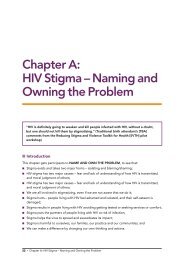Implementing Multiple Gender Strategies to Improve HIV and ... - ICRW
Implementing Multiple Gender Strategies to Improve HIV and ... - ICRW
Implementing Multiple Gender Strategies to Improve HIV and ... - ICRW
Create successful ePaper yourself
Turn your PDF publications into a flip-book with our unique Google optimized e-Paper software.
generating activities <strong>and</strong> home visits). The set of services is continually<br />
adapted as community needs change.<br />
Local Involvement/<br />
Ownership<br />
BKB works only where invited by the community, <strong>to</strong> ensure that<br />
communities are committed, active partners in program activities.<br />
Communities select the at-risk families that receive assistance. Community<br />
leaders organize, schedule, <strong>and</strong> mobilize participation in health education<br />
<strong>and</strong> other community sessions. Community members provide resources<br />
including l<strong>and</strong>, materials, <strong>and</strong> labor, <strong>and</strong> take responsibility for the<br />
maintenance of protected springs, bore hole, <strong>and</strong> water tank equipment.<br />
Evaluation<br />
Methodology<br />
• Needs assessment: At the start of the program, external consultants<br />
use surveys <strong>to</strong> identify needs <strong>and</strong> gaps in project communities. Also, at<br />
the start of every program activity, BKB meets with community leaders,<br />
women’s groups, <strong>and</strong> community-based organizations <strong>to</strong> discuss <strong>and</strong><br />
document community resources <strong>and</strong> needs. Needs are assessed using<br />
a range of <strong>to</strong>ols. For example, the need for a clean water source can be<br />
measured by the cost of a jerrycan of water in a given community, <strong>and</strong><br />
the quality of water by the incidence of water-borne diseases. BKB then<br />
works with communities <strong>to</strong> prioritize needs <strong>and</strong> select program activities<br />
<strong>to</strong> address the most pressing concerns among the most vulnerable<br />
families.<br />
• Baseline, moni<strong>to</strong>ring <strong>and</strong> endline data collection for village market<br />
project: In 2000, the FCS program conducted a baseline survey <strong>to</strong><br />
measure the need for a village market in Kitala Village. Indica<strong>to</strong>rs<br />
measured included income <strong>and</strong> literacy levels, level of buying <strong>and</strong><br />
selling, available products <strong>and</strong> goods <strong>and</strong> their costs, gaps <strong>and</strong> needs<br />
for products <strong>and</strong> goods, cost of buying <strong>and</strong> transporting goods<br />
wholesale <strong>and</strong> mark-up rates, <strong>and</strong> number of women engaged in<br />
productive activities. Data were analyzed <strong>and</strong> used <strong>to</strong> develop a market<br />
structure, which was implemented in 2000. BKB provided business <strong>and</strong><br />
skills training, l<strong>and</strong>, facilities <strong>and</strong> start-up in-kind materials for women<br />
entrepreneurs operating 100 businesses. Moni<strong>to</strong>ring data were<br />
collected annually from 2001 <strong>to</strong> 2005. Endline data were collected in<br />
2006.<br />
• Moni<strong>to</strong>ring data collection: BKB collects moni<strong>to</strong>ring data on an ongoing<br />
basis <strong>and</strong> annually, as well as periodically as needed <strong>to</strong> reassess <strong>and</strong><br />
revise project activities. BKB collects data through attendance registers<br />
<strong>and</strong> treatment records (mobile health clinic), visitation forms (home<br />
visits), school records <strong>and</strong> reports (education projects), <strong>and</strong><br />
construction records (water projects) on a range of indica<strong>to</strong>rs, including<br />
number of:<br />
- Mobile health clinic beneficiaries<br />
- Women attending mobile health clinic antenatal care<br />
- Beneficiaries receiving mobile health clinic voluntary counseling<br />
- Home visit beneficiaries<br />
- Students receiving school sponsorships<br />
- Water sources constructed <strong>and</strong> number of beneficiaries of water<br />
sources<br />
- Income-generating projects<br />
- People who directly benefited from program activities<br />
• Program reviews <strong>and</strong> evaluation: Donors <strong>and</strong> external consultants have<br />
reviewed <strong>and</strong> evaluated FCS using a range of methods <strong>and</strong> <strong>to</strong>ols.<br />
166
















